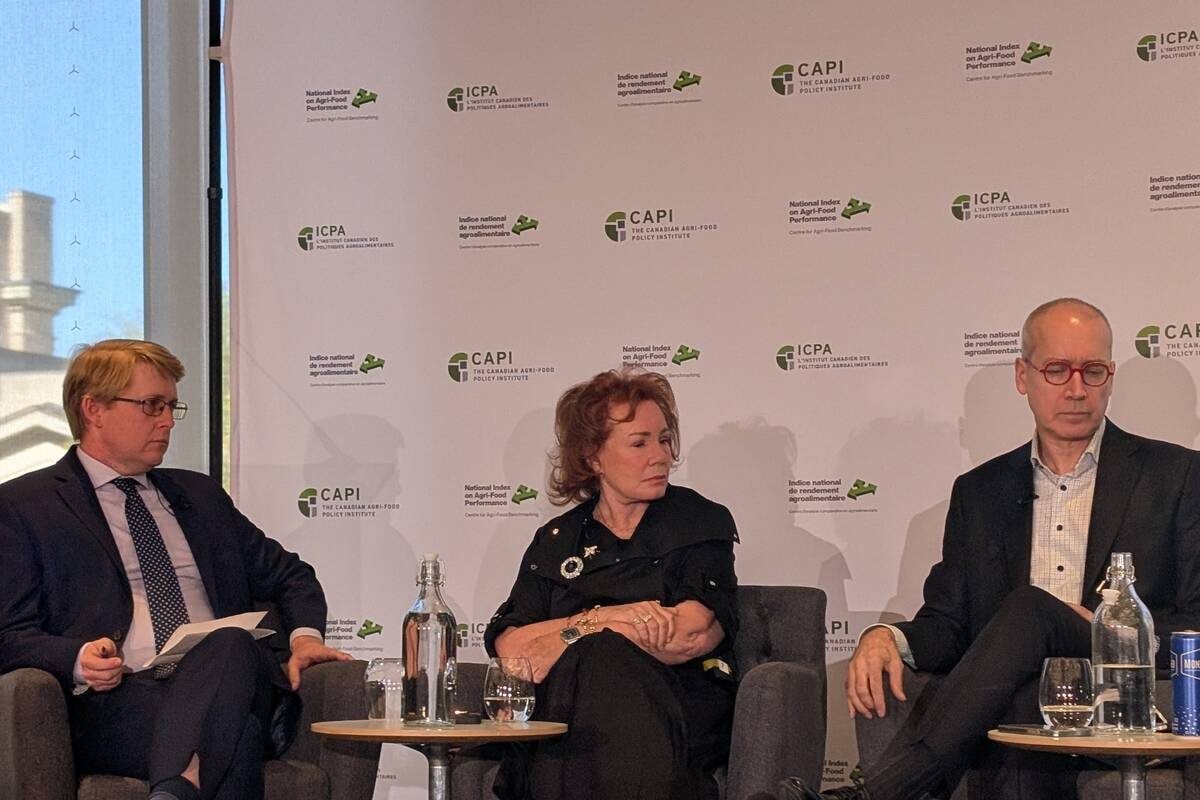She may be best known by Canadians for hearing business pitches on TV, but Arlene Dickinson has a pitch of her own for Canada’s agri-food sector.
Dickinson, founder and general partner of District Ventures Capital and mainstay on CBC ‘s Dragon’s Den, said the time is now for Canada to make agriculture and agri-food a critical sector.
She recently took a public-facing approach to Canadian agri-food and trade, including a self-funded trade mission to Asia, an op-ed on food security in the Globe and Mail and an appearance at the Canadian Agri-Food Policy Institute’s (CAPI) conference this week in Ottawa.
Read Also

Federal budget shows remaining disconnect between agriculture, policymakers, panelists say
Canada’s agriculture sector is still disconnected from policymakers in some ways, say panelists at a CAPI webinar
“Nothing but opportunity”
Dickinson’s interest in Canadian agri-food isn’t sudden; in fact, she’s been actively trying to advance the sector for years.
“I’ve been investing in the agri-food space for a decade,” Dickinson said, pointing to her business District Ventures Capital, which has invested close to $170 million in this space.
“I also started Canada’s first not for profit accelerator, run by an entrepreneur, to help businesses in early stages of starting up a food, beverage, health and wellness, (consumer packaged goods) business.”
What she’s observed over the course of time, she said, is the impact of external challenges, including those experienced through COVID, and “the lack of attention and prioritization that we have on farms and agri-food in Canada.”
With recent tariffs from the United States having an impact on producers, Dickinson said it’s become apparent to her Canada must look to other markets to allow production to scale.
“I’ve realized that there’s a big gap between funding innovation, market, knowledge of who we are, and opportunity being realized and capitalized on in the country.”

She pointed to a Farm Credit Canada (FCC) study which concluded Canada has the opportunity to diversify $12 billion worth of food and beverage exports to new markets.
“This is a gigantic economic opportunity for our nation, and we are looking at it for the first time because we have been complacent about sending our exports to the United States and taking that as a ready market. And now we do have to think about exporting it around the globe.”
She said her trip to Asia, which she undertook to understand export opportunities, opened her eyes to the reality of consumers in other markets looking for safe food from a trustworthy source.
“I look at it as an entrepreneur and see nothing but opportunity. And when there’s opportunity, you want to figure out how to pursue it.”
Dickinson suggested the need for a national agri-food brand to fill that demand.
In a panel discussion at the CAPI conference, she said she experienced lacking Canadian food presence ahead of a meeting on her trade trip.
“One of the things you want to do when you’re Asia is you want to take a gift,” she said. “Now, I didn’t think about that before I left. So, I went, I’m in Thailand, I’m in Bangkok. I’m going to go buy a Canadian gift of some sort, right? You want to represent the country. Do you think I could find anything? I could not find a thing in Thailand.”
Collective voice
To further this goal, she said groups and producers must present a unified voice for the sector.
“There’s a lot of lobbying and effort that goes on for individual groups,” she said. “There needs to be a collective voice in this space, and they need to come together more effectively in order to be heard.”
As for her own pitch for the sector, Dickinson didn’t propose any radical changes. Rather, she said Canada must act on the recommendations that already exist.
“There has been a lot of work done, whether it’s through groups coming together at roundtables, whether it’s through consultation with the industry, whether it’s through hiring consultants who come in and help us understand it,” she said.
“Over decades, the same, exact list of things that have to be done for the sector to be able to grow are brought forward, and nothing’s been acted on.”
“My pitch is, if we don’t do that, the risk to Canadians is huge, the risk to us, to our health, to our prosperity, to our ability to innovate and grow our economy significantly, are off the table if we lose our food.”
This includes increased investments and making agriculture and agri-food a critical sector.
“My pitch would be this is absolutely a marketplace and an industry and a sector that needs full attention and can provide gigantic return profiles to our country, not just financially, but from a social perspective as well.
“So, it really hits all the buttons. Why wouldn’t you invest in it?”














